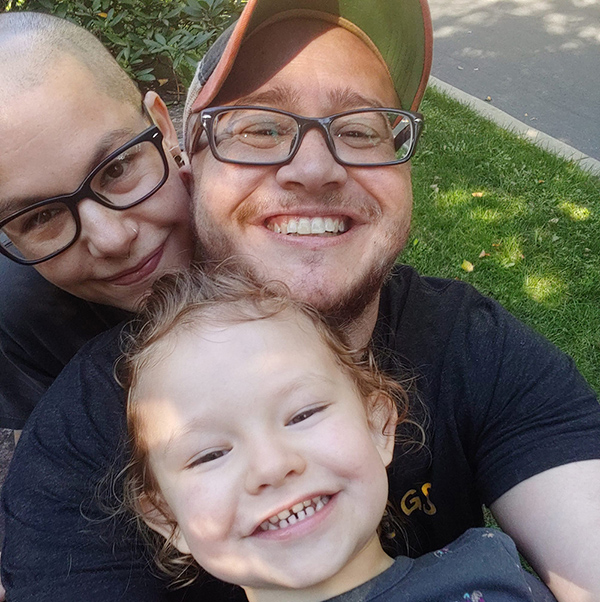Advocates View Health Care as Key to Driving LGBTQ Rights Conversation
When Allison Scott came out as a trans woman in 2013, she told not only family and friends, but also her primary care physician.
She didn’t need his help with hormone therapy. She had another doctor for that. But she wanted to share the information with her doctor of more than 10 years in case it affected other aspects of her health.
She was shocked when he told her he would no longer treat her.
“It was humiliating,” said Scott, now director of policy and programs for the Campaign for Southern Equality, an LGBTQ advocacy organization based in North Carolina. “It’s not because the provider doesn’t have the knowledge they need, but because the provider isn’t comfortable with who you are.”
Surveys in North Carolina and across the nation show that about one-third of transgender people have been refused treatment or suffered verbal or physical abuse from a medical provider.
Such concerns have become more worrisome during the covid-19 pandemic, when being denied health care — or avoiding it due to fear of discrimination and previous negative experiences — can have deadly consequences.
But Scott and other advocates in North Carolina now see an opening to push for city and county laws prohibiting this type of treatment. A state ban preventing local governments from enacting nondiscrimination ordinances expired on Dec. 1.
The ban was a remnant of the controversial 2016 “bathroom bill,” which catapulted North Carolina into the national spotlight by making it the first state to require transgender people to use the bathroom of the gender on their birth certificate. Although public backlash and economic repercussions forced the state to repeal that law, the legislature replaced it with one that blocked local governments from passing nondiscrimination ordinances.
Now new laws could address discrimination in employment, housing, public places and more. Scott said health care should be among the top considerations, whether that means banning discrimination on the basis of gender identity and sexual orientation in hospitals and clinics or preventing someone from being fired for their identity and losing health insurance as a result.
So far, the towns of Carrboro, Hillsborough and Chapel Hill, along with Orange County, jointly announced this month new nondiscrimination ordinances that will protect LGBTQ individuals in workplaces and in public. At least two other cities are drafting ordinances and plan to vote on them later this month.
These local actions take on added significance in view of efforts during the past four years to roll back federal protections for LGBTQ people. The Trump administration has tried to expand the interpretation of religious liberty and civil rights laws to protect medical providers who refuse to provide services for religious or moral reasons. Last summer, the administration reinterpreted the Affordable Care Act’s nondiscrimination requirements to remove Obama-era protections for LGBTQ people. This month, it removed explicit provisions that prohibited social service providers who receive Department of Health and Human Services grants from discriminating on the basis of sexual orientation and gender identity, among other characteristics. Sasha Buchert, a senior attorney with Lambda Legal, said the change affects a wide array of programs, from Meals on Wheels to child welfare agencies, HIV/AIDS services and more.
Although many of these actions have been blocked by courts, and the incoming Biden administration has promised to reverse several of Trump’s policies, LGBTQ advocates and legal experts say those processes take time and are not guaranteed.
“To put it plainly, having protections at the local level sometimes offers more protection, particularly as laws are being contested at the federal level,” said Lindsey Dawson, a researcher who studies LGBTQ issues at KFF. (KHN is an editorially independent program of KFF.)

A Path Forward
In recent decades, protections for LGBTQ Americans have emerged as a cultural flashpoint, often triggering debates about religious liberties versus civil rights and involving anything from marriage and parenting to offices and bakeries.
Critics of nondiscrimination laws say they squash valid debate in health care about what constitutes ethical treatment.
Ryan Anderson, a senior research fellow with the conservative think tank the Heritage Foundation, said no one should be turned away from medical care because of their identity, but laws need to distinguish between that type of discrimination and medical providers who disagree on a certain treatment plan.
“If there’s an adult who wants to transition and a doctor and health care plan who want to support that, they can do that,” Anderson said. “But if the doctor or health plan don’t want to support that, they should also be free not to do that.”
For advocates who work with LGBTQ people daily, the need for nondiscrimination laws is clear. Ames Simmons, policy director for Equality NC, recounted the experiences of people he knows: One trans woman was threatened with arrest if she didn’t leave a hospital in the western part of the state, while another was denied care at a dialysis clinic in eastern North Carolina after she complained about harassment.
Research shows that LGBTQ people in states with nondiscrimination laws experience fewer disparities in employment, education and health care than those living in states without such laws. And city- and county-level actions may provide a road map for broader efforts. Christy Mallory, legal director at the Williams Institute at UCLA, pointed to the example of Utah, where a series of local ordinances eventually led the traditionally conservative state to pass a nondiscrimination law in 2015.
The laws don’t automatically change people’s beliefs, Mallory said, but they provide a starting point to build momentum toward statewide and cultural changes.

Pandemic Urgency
Advocates cite an added imperative to protect LGBTQ rights because the covid pandemic has highlighted shortcomings and disparities in the nation’s health care system. A report by the Movement Advancement Project, a Colorado-based think tank, found 1 in 8 LGBTQ people have lost insurance coverage during the pandemic — twice the rate of non-LGBTQ people. Many are unable to afford hormone therapy or counseling. In some parts of the country, transgender people have reported mistreatment at covid testing sites.
Even before covid, transgender patients who came to Dr. Jennifer Abbott, a family physician at Western North Carolina Community Health Services in Asheville, often told her they had called as many as 10 other providers before finding someone willing to treat them. Abbott, who heads the clinic’s transgender health program, said about one-third of its approximately 400 patients come from rural areas across the western part of the state.
For some, the promise of nondiscrimination laws reaches beyond questions of access. The laws can also temper discriminatory behavior by sending a clear message about what is acceptable in a community, said Michael Hoeben, who coordinates services for transgender and HIV patients at the clinic and is a transgender man.
Once, when Hoeben was having a cervical polyp removed, the doctor asked him what it meant to be transgender. The doctor and nurse proceeded to laugh at Hoeben’s response while performing the procedure, he said. Hoeben was so mortified that he avoided seeing a doctor for the next seven years.
A law may not have prevented that experience, Hoeben said, “but without the law, it’s like open season.”
“For your local government to pass a law that says we see you, we recognize you and we include you,” Hoeben said, “that is a level of safety you’re constantly seeking as a trans person.”







